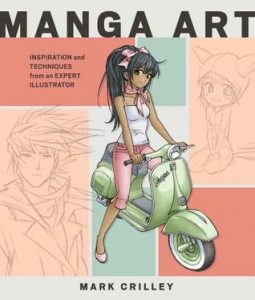 I requested a copy of Mark Crilley‘s Manga Art from Blogging for Books.
I requested a copy of Mark Crilley‘s Manga Art from Blogging for Books.
Description from Goodreads:
The world of manga (Japanese comics) has captured the imagination of artists, both aspiring and professional alike. Now best-selling artist and art instructor Mark Crilley presents the most complete look yet at the variety of creative options available in the world of manga. Crilley fills each chapter with gorgeous, original artwork created with a variety of tools (pencils, colored pencils, digital art, pen and ink, and more) and in a variety of manga-inspired styles. He pairs each piece with information on the materials used and the inspiration that led to its creation. Manga Art provides readers a one-of-a-kind chance to hear from one of the leading artists in the field of manga instruction, as he reveals the unlimited possibilities of manga and the creative secrets behind over 100 pieces of original, never-before-seen artwork.
Review:
I got this for my 10-year-old daughter who is a budding artist and enjoyer of anime. (I’ve worked hard to instill in her my love of manga, but anime is as close as we’ve gotten so far. I’ll take it, baby steps.) I left the book with her for quite a long time before sitting her down and asking her opinion of it. I knew she liked it, since I’d seen her several times flipping through it, probably getting ideas. But wanted her words about whether she’d found it helpful in learning to recreate the pictures in it.
She informed me that it did not. And to be wholly fair, the book isn’t intended to be instructional. At least not in the way I’d assumed when I gave it to her. The book doesn’t do much to break down bodies or show the reader how to draw the pictures it contains. What it does instead is present examples of a variety of manga art style. Because there is a difference between common Shojo styles and Shonen styles, for example.
My daughter appreciated being able to see the differences, though she’s not quite old enough or experienced enough to have recognize all of them. It will be a handy reference guide going forward when she wants to create different feels in her drawing.
I can see this book doing well for artists looking for reference material, but I can also see it being a winner with manga/anime fans, especially those old enough to have a coffee table. It would make a pretty, conversation starting, coffee table book.